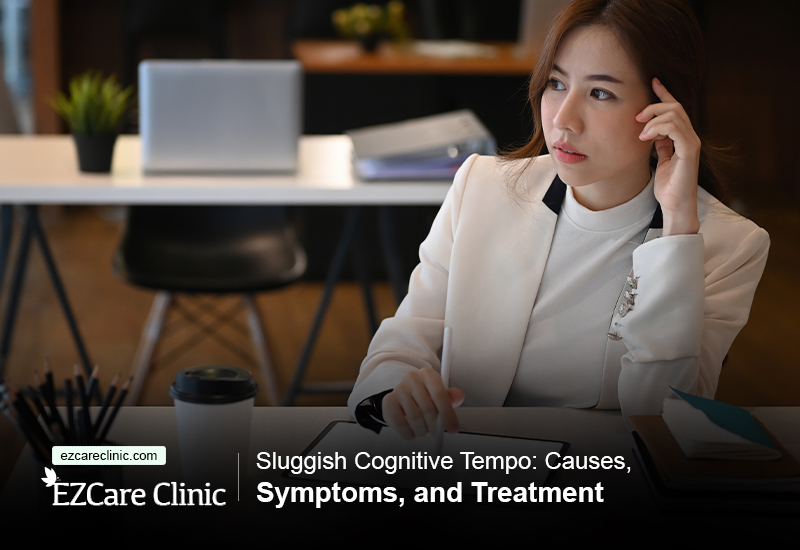Sluggish Cognitive Tempo, abbreviated as SCT, is an attention deficit hyperactivity disorder (ADHD) related syndrome. However, unlike ADHD, SCT isn’t regarded as a medical diagnosis.
Many signs exhibited by patients affected by this condition are often similar to those of patients affected by ADHD.
Get the signs of ADHD under control- Click the button below.
Studies on patients affected by ADHD/ADD reveal a possible correlation between the two conditions.
The study suggests that 30% to 63% of patients with Inattentive-type ADHD often have high levels of SCT. The condition has been a source of contention for decades, even presently, as debates about its nature continue.
However, it’s becoming more evident that the set of symptoms observed independently harm an individual’s functioning leading to:
- Diminished quality of life
- Suicidal behavior
- Higher stress levels
- Diminished educational success
- Lower social-economic statuses
You’ll need to read this guide if you want to understand what Sluggish Cognitive Tempo is. You can find answers to some of the most relevant questions that are relevant to this condition.
1. Understanding What Sluggish Cognitive Tempo Means
Sluggish Cognitive Tempo, or SCT, was initially coined in 1948. It wasn’t, and isn’t, officially recognized as a medical diagnosis; however, it shares many symptomatic similarities with ADHD’s inattentive type.
Individuals affected by SCT often find it difficult to pay attention or focus. However, compared to individuals with ADHD, they have a lower tendency for hyperactivity or impulsivity.
To date, researchers are still trying to figure out what causes SCT and how it can be defined as a separate disorder.
However, they’ve only developed explanations for how the condition’s symptoms could affect various domains in an individual’s lifestyle.
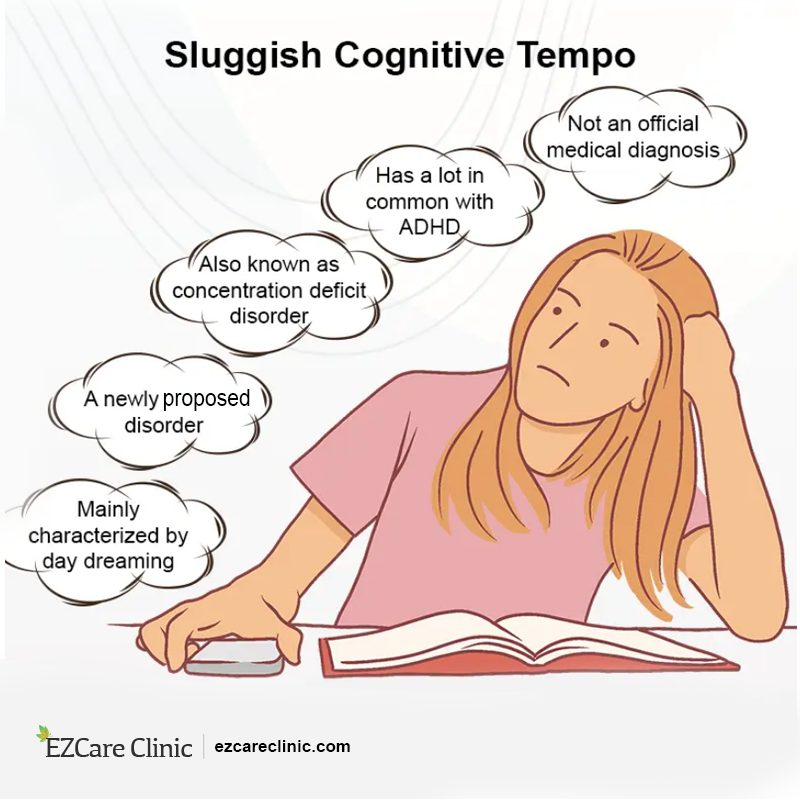
Let’s begin by looking at SCT’s history and its relevance with ADHD.
Sluggish Cognitive Tempo’s History With Regards to DSM
Historical traces of attention disorders date back to 1798 when Sir Alex Crichton first described attention problems in his book. The attentional problems described include daydreaming and inattentiveness.
Plus, the symptoms discussed resembled those found in individuals affected by Sluggish Cognitive Tempo.
Scientific studies of SCT began in the 1980s when the DSM or Diagnostic and Statistical Manual of mental health disorders’ third edition was published.
This DSM edition subdivided ADHD into two categories:
- ADHD that came with inattentiveness (ADHD-I)
- ADHD that came with hyperactivity (ADHD-H)
The researchers were determined to find the differences between the two.
A clinical psychologist named Russell Alan Barkley, who was also VCU medical center’s clinical professor of psychiatry, was involved in the research mentioned above. He proposed that the initial name, Sluggish Cognitive Tempo or SCT, be altered to concentration deficit disorder or CDD, a specific condition in DSM.
The three ADHD subtypes recognized currently are the same subtypes identified and recognized in the DSM’s 5th edition.
They included:
- Predominantly hyperactive-impulsive type
- Predominantly inattentive type
- Combined type
However, SCT wasn’t recognized as a separate diagnostic criterion that needed to be added to the DSM.
SCT’s symptoms aren’t included in the current DSM because they’ve been found to have a weak association with other symptoms connected to inattention.
Are the Terms Slow Processing Speed and SCT Similar?
These two terms often overlap since they’re both involved with the cognitive process.
Processing speed is used to reference the length of time an individual takes to perform a mental task. SCT is a much broader term that’s involved with lack of energy and daydreaming.
Processing speed refers to the rate at which an individual accesses, digests, and reacts to information, whether through sight, sound, or movement.
It’s unusual for individuals to develop slow processing speeds if they get affected in only one of these areas. People who develop slow processing speeds are usually affected in two or more areas.
Sluggish cognitive tempo can be linked to slow processing speed; however, it is a much broader condition that affects how children interact with the environment. Kids with SCT may seem:
- Tired
- Sleepy
- Move slowly
- Daydreaming
However, it would be good to note that this, by itself, doesn’t imply that the kid will show a slow processing speed on the intelligence test, WISC.
SCT is relatively new in the field of mental health disorders, and more studies need to be done to clear up the differences between slow processing speed and SCT.
Some individuals with the predominately inattentive type of ADHD also display the symptoms that are associated with SCT- Click below to get them treated.
The Connection: SCT and ADHD
Sometimes, it is possible for individuals affected by inattentive ADHD to exhibit a subset of symptoms like mental fogginess and sedentary behavior that are characteristic of SCT.
Despite the overlap in these two conditions, several researchers are effectively convinced that the two conditions are distinct.
For instance, a meta-analysis done by Becker et al. through studying 19000 children and adults determined that ADHD symptoms were different from SCT symptoms.
The overlapping nature between SCT and inattentive ADHD symptoms makes it difficult for Sluggish Cognitive Tempo to get official recognition.
Proponents argue for SCT’s official recognition and the need for an official diagnosis that’ll make it easier for individuals with SCT symptoms to get the help they need, be it in school, social structures, or even proper medication.
However, critics also dismiss the condition stating that it’s a fatally flawed misdiagnosis outgrowth that could lead to wrong medical prescriptions for affected individuals.
2. Symptoms Associated With Sluggish Cognitive Tempo
SCT is currently called a clinical construct.
This is a term used in psychology to refer to various groups of behaviors like difficulties with:
- Self-organization
- Problem-solving
- Processing sources of information
- Self-initialization
Individuals affected by this condition are thought to have a hypoactive (less active) character.
Barkley created an SCT symptoms rating scale for adults in 2012 and a 12-item children’s rating scale later on.
The initial sample was represented to 1922 parents in the US to complete. Later on, other researchers, including Becker and his colleagues, expanded the list to include four more symptoms in children.
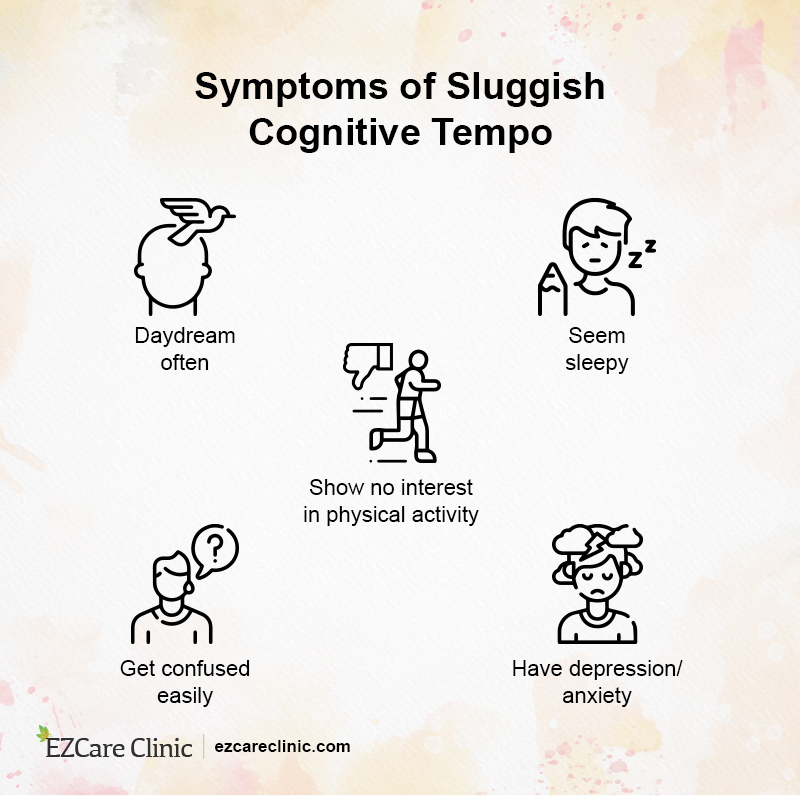
SCT Symptoms
- Slow or sluggish behavior
- Experiencing a foggy trance
- Staring blankly
- Feeling tired or sleepy all the time
- Daydreaming
- Experiencing fatigue more quickly
- Racing thoughts
- Forgetting what they were about to say
- Getting confused easily
- Apathetic nature (low motivation to complete tasks)
- Difficulties expressing thoughts
- Slow thinking
Comparisons Between SCT and ADHD Symptoms
Here is a list of symptoms of both Inattentive ADHD and Sluggish Cognitive Tempo for comparison and analysis to observe where symptoms from both conditions overlap.
Symptoms | ADHD | SCT |
|---|---|---|
Low attention span | ✓ | ✓ |
Poor attention to detail | ✓ | ✓ |
Failure to finish tasks | ✓ | |
Does not listen carefully when spoken directly | ✓ | |
Poor organization skills | ✓ | |
Avoiding tasks that require lots of mental work | ✓ | ✓ |
Forgetfulness | ✓ | ✓ |
Multiple distractions from extraneous stimuli | ✓ | ✓ |
Sleepiness | ✓ | |
Laziness | ✓ | |
Easily confused | ✓ | |
Daydreaming | ✓ |
How Common Is Sluggish Cognitive Tempo?
Initially, the SCT condition was thought to occur in individuals that had inattentive ADHD. However, researchers soon discovered that SCT occurred in individuals with all types of ADHD and even those who didn’t.
The estimated co-occurrence rate for ADHD and SCT is about 39 % to 59 %, and the remaining percentage is used to indicate SCT’s occurrence in the ADHD’s absence.
3. Sluggish Cognitive Tempo: A Mind Wandering Disorder
Although there are other symptoms involved with sluggish cognitive tempo, including delayed behavior, mental confusion, and mind wandering, daydreaming is the most common symptom used when diagnosing STC.
Mind-wandering and SCT often involve situations where individuals detach their attention from external stimuli and focus on various personal thoughts.
There wasn’t any direct link between SCT and mind wandering in earlier research.
However, when researchers added the condition’s symptoms to a model meant to find the relationship between mind wandering and ADHD inattentiveness, later on, they found a predominant link between ADHD and SCT.
Is it possible that SCT is a disorder of mind wandering?
Before we find an answer to that question, let’s first define what mind wandering is.
What Is Mind Wandering?
Mind-wandering reduces attention to external stimuli where individuals actively focus on internal events and thoughts, i.e. daydreaming. This can be either intentional or unintentional; however, it can be used for constructive purposes when done intentionally.
The condition involves using additional executive functioning (EF) capacity (working memory) to actively focus on other problems, objectives, concerns, or thoughts while simultaneously performing specific goal-oriented actions.
However, when this is done excessively and spontaneously, it affects the EF’s capacity to work on primary tasks or goals. This slows progress raises errors and prevents the individual from achieving the primary goal or task on time.
Mind-Wandering Vs. SCT Daydreaming
Daydreams happen when an individual’s mind wanders, and their attention shifts to other thoughts other than the task at hand regardless of whether the task is mental or physical. It consists of visual imaginations of the self in the future, present, or past.
Daydreaming often occurs in individuals with SCT. Such individuals often look to divert their attention from tiring tasks or tasks that trigger their anxiety.
The main difference between these two conditions is that daydreaming is done consciously while mind wandering is subconscious.
You’ll rarely realize that your mind is wandering, whereas you have more awareness when daydreaming; however, the latter can be considered part of mind wandering.
4. Sluggish Cognitive Tempo: Causes
Why do people get affected by sluggish cognitive tempo? What is the underlying reason behind the sluggish behavior and daydreaming?
These are some common questions that you may be asking right now; however, we have to lead by stating that the general causative reasons have not yet been found.
Only a handful of studies have been conducted regarding the condition, i.e. the heredity factor. However, more research needs to be done regarding its etiology.
But it’s been noted that there are various causative reasons for each case, and they involve both environmental and non-environmental (genetic) factors.
Sluggish cognitive tempo (SCT) isn’t an official medical diagnosis but has a lot in common with some types of ADHD– Click below to schedule your appointment with a mental health expert.
Below, you’ll find an explanation of the investigated causes of SCT:
Heredity
There isn’t much evidence of heredity in SCT. While a study conducted by Moruzzi et al. in 2013 tabled some evidence on the possibility of heredity, it was limited by the short number of symptoms used to identify SCT, which raised more questions on the study’s reliability.
The studies appeared to reveal that SCT, much like ADHD, is closely heritable or genetically influenced.
This leaves the possible explanation that the condition is more likely to be less heritable and could involve a more significant contribution of unique or unshared environmental factors.
Prenatal Exposure to Alcohol
Alcohol affects developing fetuses in many ways, and one of them involves their cognitive development. Research done found an increase in sluggish cognitive tempo in children who had experienced prenatal alcohol exposure.
The cognitive impairments experienced by such individuals include defects in their:
- Executive functioning
- Intellectual performance
- Memory
- Learning
- Language
- Motor function
- Visual-spatial ability
- Activity
- Attention
- Behavioral problems
Brain Structure and Function
While more research needs to be done regarding SCT’s neurobiological studies, existing symptoms seem to indicate a greater involvement of posterior attention networks than the prefrontal cortex region of the brain, plus persistent difficulties with the individual’s working memory noticeable with ADHD.
A 2015 neuroimaging study between teenagers with ADHD-inattentive symptoms and SCT symptoms discovered that individuals with SCT had decreased activity in the left superior parietal lobe.
However, symptoms of inattentive ADHD were linked to various other abnormalities in SPL activation.
Acute Lymphoblastic Leukemia
Some evidence suggests a higher rate of SCT in acute lymphoblastic leukemia (ALL) survivors.
ALL is a type of blood cancer that often starts in the affected individual’s bone marrow, the soft, inner part of your bones that develops from immature lymphocytes (white blood cells that make up part of your immune system).
The study revealed a
They may develop symptoms like motor skill problems, a slow processing speed, and attention difficulties.
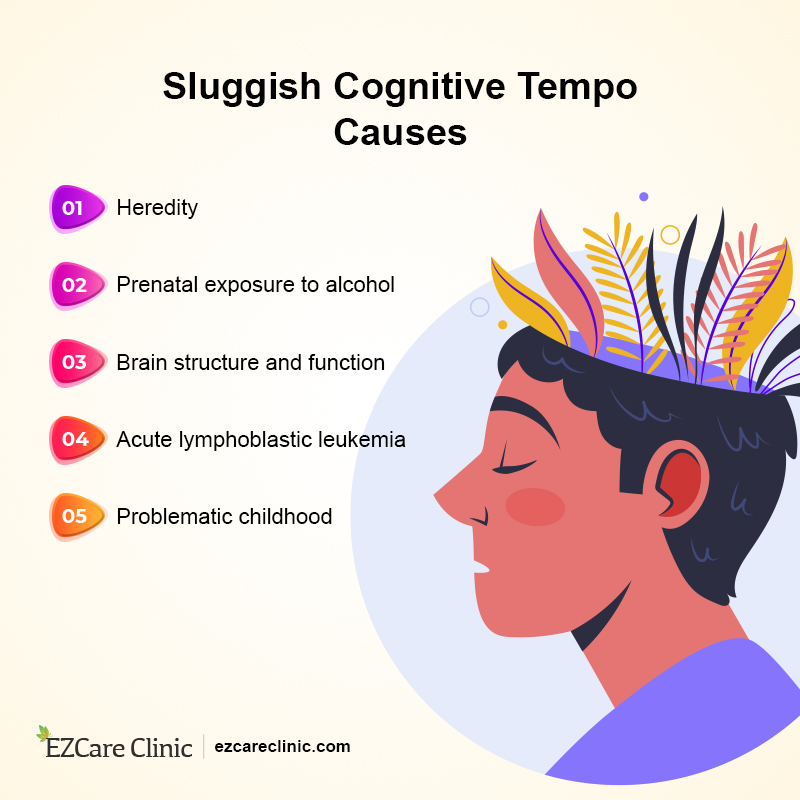
SCT and IQ
IQ or intelligence quotient is also thought to be one of the factors that may cause SCT; however, while more research is being done, no conclusive evidence has come forth.
Researchers have always thought that it could be highly probable that low IQ levels could be associated with mental ability and cognitive functioning deficiencies; however, more research needs to be done to determine whether low IQ could cause SCT.
Problematic Childhoods
Environmental factors like problematic childhoods have been known to play a role in mental deficiencies.
In this case, the affected child could choose to dissociate themselves from environments that they may deem too stressful by focusing their thoughts on other events, a defense mechanism they may have adopted during their stressful childhood.
Click the button below to book your appointment with a mental health expert.
5. Sluggish Cognitive Tempo: Diagnosis
SCT isn’t included in the DSM literature; therefore, psychiatrists or psychologists will have to be extra careful while diagnosing adults or children’s inattentive behavior.
They’ll need to follow the context of the symptoms mentioned above minus symptoms involving impulsivity or hyperactivity.
There are standardized diagnostic tools and scales they could use to measure an individual’s symptoms and diagnose a specific disorder and gauge its intensity. They could use a screening test to diagnose patients with SCT.
How is it done, and what tools are used?
Diagnosis by a Psychiatrist or a Psychologist
A professional diagnosis from a psychiatrist or a psychologist should assure beyond all reasonable doubt that you have SCT and ensure that it is distinguished from ADHD and other cognitive impairment conditions.
The psychologist or psychiatrist will make inquiries about your child’s emotions and behavior. They could even go ahead and ask their teacher to fill a questionnaire that contains questions relevant to your child’s behavior.
They’ll proceed to compare your kid’s symptoms with various other conditions like anxiety, ADHD, and depression and use the results to determine the probability that your child has a Sluggish Cognitive Tempo.
Scales That Are Used for Diagnosing SCT
Here are the scales that are used for diagnosing SCT:
- The Barkley Sluggish Cognitive Tempo scale- Children and Adolescents (BSCTS-CA)
This is the first norm-referenced, experimentally-based test designed to assess Sluggish Cognitive Tempo’s symptoms like the inability to focus, recurrent daydreaming, and general lethargy in children and adolescents aged 6 to 17’s daily life activities.
The scale takes both children and parents only 5 minutes to complete.
Scoring and interpretation instructions are available in detail, plus a clinical interview form based on the rating scale.
- The Concentration Inventory (Used for Both Children and Adults)
The ACI or adult concentration inventory is a measure where adults can self-report SCT symptoms. In contrast, the CCI-2 is the
The ACI is similar to the CCI-2, with only a few modifications in the anchors and an additional four extra impairments related to SCT.
The CCI-2 contains 16 items rated on a four-point scale and is a revision of the CCI measurement that can be dubbed CCI-1.
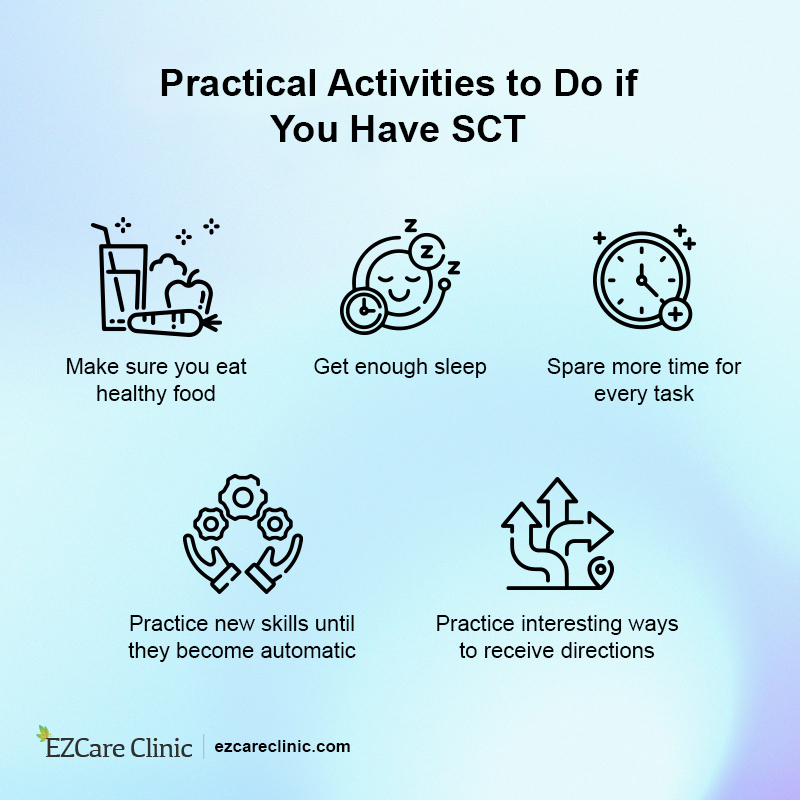
- The Comprehensive Behavior Rating Scale for Children (CBRSC)
CBRSC is designed to avail an entire overview of the child or adolescent’s disorders and concerns. The scale has rating forms for teachers, parents, and children. It serves to provide an informed assessment of young adults and children across various settings.
The scale is used to measure:
- Aggressive behavior
- Emotional stress
- Impulsivity/ hyperactivity
- Academic difficulties.
- Social problems
- Academic difficulties
- Compulsive and perfectionist behavior
6. Sluggish Cognitive Tempo: Areas of Life Impairment
The American Psychological Association states that for any condition to be termed a mental disorder, there should be evidence of harm or impairment (or any adverse consequences) affecting the individual directly due to the symptoms.
While symptoms are ways through which a disorder is expressed, impairment refers to the consequences as a direct or indirect result of the symptoms.
Research on Sluggish Cognitive Tempo reveals that the condition can affect the victims in several ways, like their mental health and functioning, which can spill over to their school, work, and social life.
Domains of Impairment
The domains of impairment are given below:
- Socioemotional Functioning
A strong link has been found between SCT symptoms and social problems (in general), but specifically with social withdrawal.
Studies done to determine the link between
The problems include poor student-teacher relationships, peer rejection, and decreased perception of subtle social cues. Children affected with SCT will more likely be isolated or socially withdrawn because of their social disinterest or shyness.
Sluggish cognitive tempo (SCT) is a syndrome related to attention deficit hyperactivity disorder (ADHD)– Click below to get it treated.
- Mental Functioning
Although Sluggish Cognitive Tempo is quite distinct from depression or anxiety, there is a significant relationship between the condition and various internalizing symptoms of depression and anxiety.
This was truer in children than adults, and could therefore increase the rate of depression in children transitioning to adolescence and adulthood.
While we are on mental functioning, we will note that forgetfulness was one of the primary symptoms of SCT.
As such, individuals affected with Sluggish Cognitive Tempo may tend to develop thought problems like distractible speech, easily distracted thoughts, or brief and unelaborated responses to asked questions.
Such individuals may also find specific tasks like memory tasks and timed tests challenging.
- Academic Functioning
Studies have found a prevalent relationship between individuals affected by sluggish cognitive tempo and poor academics regardless of whether or not they have ADHD. Students with SCT often have difficulties completing their homework assignments and self-organization.
They also develop poor study skills and display deficits in self-regulation study strategies.
Regarding academic achievement, students affected by SCT often have problems with written language, word reading, and mathematics.
However, academic functioning deficits are far lower in students with SCT compared to those with ADHD.
- Functional Impairment
Functional impairment is a term that refers to an individual’s inability to perform various essential daily functions as a direct result of a disease’s symptoms.
Thus, SCT is often linked to individuals with an increasingly stressful life, lower socioeconomic status, low educational attainments, and poor quality of life.
Functional impairments are often a direct result of sedentary behavior and low focus resulting from sluggish cognitive tempo.
The condition can significantly affect daily tasks in life, including personal hygiene, maintaining a daily routine, and performing chores.
7. Sluggish Cognitive Tempo: Prognosis and Treatment
SCT treatment approaches done by psychiatrists and psychologists are those used to treat individuals with ADHD.
More in-depth research needs to be done on the treatments and prognosis regarding Sluggish Cognitive Tempo.
More research could help provide better prognostic and treatment approaches, improving the chances of controlling the condition or even recovery.
The prognosis discussed below is a general approach based on the onset of the symptoms and their ultimate results.
The accurate data statistics used aren’t known; however, this section provides you with detailed SCT prognosis and treatment plans.
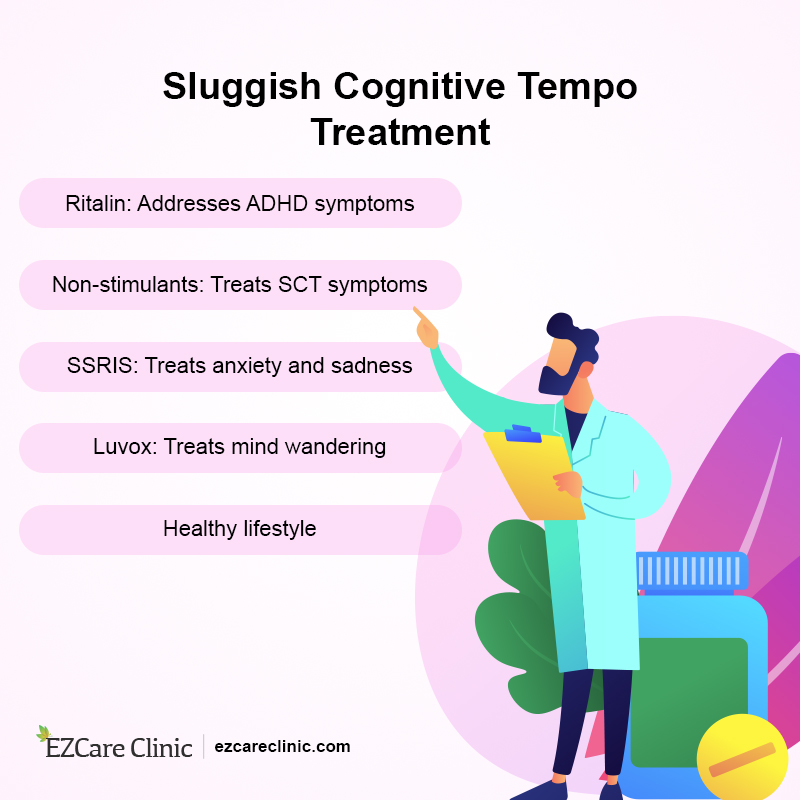
Sluggish Cognitive Tempo: Prognosis
A prognosis is a prediction that determines a condition or disease’s course and outcome plus the expected outcome resulting from an intervention.
A prognosis can be used to estimate the likelihood of a patient’s recovery from a condition or disease. In this case, a prognosis could be used to assess an individual’s SCT symptoms, determine the condition’s course, intervention measures, and possible recovery.
People with SCT often show their symptoms later than those affected with ADHD by up to one year or two. The patients will experience more problems with their academic tasks and have fewer social difficulties due to the condition.
The risk of externalized disorders like social aggression, conduct disorder, and oppositional defiant disorder is low in individuals with SCT. The symptoms that individuals affected by SCT experience are often more manageable than treatable.
How to Treat Sluggish Cognitive Tempo
The most appropriate SCT treatment often involves medication, lifestyle change, and therapy.
- Medication
SCT, like ADHD, often results in problems with attention; therefore, the best medications that psychologists and psychiatrists can use to treat this condition are stimulants, specifically Ritalin (methylphenidate).
Such medication could help individuals affected with SCT focus and pay attention in the same way they work on individuals diagnosed with ADHD.
The medication is meant to make the individuals feel more alert, awake, energetic, and confident.
Individuals affected by SCT who have other conditions like depression and anxiety (comorbid conditions often associated with SCT) could also get the appropriate medications to alleviate their symptoms.
They could get some antidepressants and anxiolytic medications to help ease these conditions.
- Therapy
Individuals affected by sluggish cognitive tempo could also benefit from special education programs and therapy sessions.
The two approaches could help such individuals learn better ways to process information, improve their social skills, and boost personal, organizational habits.
CBT (Cognitive Behavioral Therapy) is considered to be the best go-to therapy for SCT.
CBT is a therapeutic intervention that helps people change their way of thinking, positively influencing their behavior.
While CBT is commonly used for individuals with anxiety disorders, it could also be helpful for those with ADHD disorders. It helps such individuals change their way of thinking regarding their ability and future.
CBT aims to identify the flawed thought process that could be affecting your behavior and try to reprogram you into having a healthier response towards thoughts that seem to trigger your SCT symptoms.
Individuals affected by SCT, as with those that aren’t, often encounter setbacks in various life situations, i.e. their social life, job, and everyday organization.
However, these setbacks often affect such individuals differently. They may become pessimistic or self-critical, which is more likely to cause them to experience cognitive distortions, negative emotions, and less-healthy self-beliefs.
Through CBT, such individuals could get into the right headspace to turn unhealthy beliefs into healthy, more optimistic thoughts.
- Better Lifestyle
There are many ways to organize your life, and doing this comes with several unique benefits. Organizing your life involves cultivating good sleep habits, exercising regularly, and following a healthy diet.
Here are some of the tips you could apply if you want to live a more organized life:
- The best way to get out of your hazy routine, or lack of, is by creating a list of tasks you need to do the following day before you get to bed.
- You’ll also need to stay more active. You could achieve this by working out regularly. You don’t need to do much. For instance, you could begin with a daily 30-minute walk. Doing this will make you more active, energetic, and focused.
- It would also be good to ensure that you went out and got some fresh air and sunlight regularly. The fresh air will leave you feeling more focused, while the sunlight will help regulate your circadian rhythm, which improves your sleep.
- Ensure that your diet consists of healthy meals with healthy servings. Avoid processed foods because they tend to mess up your hormones, leaving you confused and dazed. Eating natural and healthy foods will help you avoid the high-low dopamine feeling that’ll make your mind more sluggish.
- Supplements
You could also try some natural remedies like nutrition and supplements to try and deal with the symptoms.
Consuming these supplements could provide your brain with the necessary nutrients it needs to produce essential hormones. It would also be good to drink lots of water to help your body eliminate any toxic waste.
The best supplements that you could try out include:
- Zinc
- Iron
- Omega-3 fatty acids
- Vitamin D
- Inositol
- Multivitamins
SCT symptoms do sometimes co-occur with the inattentive symptoms of ADHD– Click below to get it treated.
Final Words
Sluggish cognitive tempo is a relatively new concept.
However, despite the low amount of evidence that researchers could use to argue for its recognition as a mental disorder, the fact that the cluster of symptoms discovered has been known to significantly affect an individual’s functioning cannot go unrecognized.
Therefore, if you or your loved one seems to display said symptoms, the best thing to do would be to seek professional help ASAP to overcome any impairments.
Click the button below to schedule your appointment with MEDvidi.
